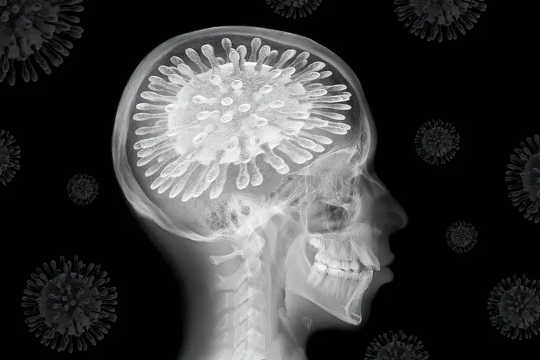 The novel coronavirus is affecting our brains, whether we’ve caught it or not. Teo Tarras/Shutterstock
The novel coronavirus is affecting our brains, whether we’ve caught it or not. Teo Tarras/Shutterstock
Whether you have contracted COVID-19 or not, your brain is likely to have changed over the past few months. The virus itself can cause a number of neurological problems, along with anxiety and depression. The isolation and worry caused by the pandemic can similarly alter our brain chemistry and cause mood disorders.
In our new paper, published inb Neuropsychopharmacology Reviews, we have investigated how to best overcome the brain changes linked to the pandemic.
Let’s start with COVID-19 infection. In addition to mood disorders, common symptoms include fatigue, headaches, memory loss and problems with attention. There may be a number of reasons for these brain changes, including inflammation and cerebrovascular events (a syndrome caused by disruption of blood supply to the brain).
Research suggests that the virus may gain access to the brain via the forebrain’s olfactory bulb, which is important for the processing of smell. Loss of smell is a symptom in many patients with COVID-19.
As part of the system responsible for your sense of smell, the olfactory bulb sends information about smell to be further processed in other brain regions – including the amygdala, orbitofrontal cortex and the hippocampus – which play a major role in emotion, learning and memory.
As well as having extensive connections to other brain regions, the olfactory bulb is rich in the chemical dopamine, which is important for pleasure, motivation and action. It may be that COVID-19 alters the levels of dopamine and other chemicals, such as serotonin and acetylcholine, in the brain, but we can’t say for sure yet. All these chemicals are known to be involved in attention, learning, memory and mood.
These changes in the brain are likely responsible for the mood, fatigue and cognitive changes that are commonly experienced by COVID-19 patients. This in turn may underlie the reported symptoms of stress, anxiety and depression in patients who have contracted the virus.
 Lockdown has been stressful for many people. fizkes/Shutterstock
Lockdown has been stressful for many people. fizkes/Shutterstock
But it’s not just people who have contracted the COVID-19 virus that have suffered from increased anxiety and depression during the pandemic. Excessive worry over contracting or spreading the virus to other family members, as well as isolation and loneliness, can also change our brain chemistry.
Repeated stress is a major trigger for persistent inflammation in the body, which can also affect the brain and shrink the hippocampus and therefore affect our emotions. Stress can also affect levels of brain serotonin and cortisol, which can affect our mood. Eventually, these changes can cause symptoms of depression and anxiety.
Brain training
The good thing about the brain, however, is that it is incredibly plastic, which means it is changeable and can compensate for damage. Even serious conditions such as memory loss and depression can be improved by doing things that alter the brain function and its chemistry.
Our paper looks at promising solutions to combat symptoms of stress, anxiety and depression – in COVID-19 patients and others.
We already know that exercise and mindfulness training – techniques that help us stay in the present – are helpful when it comes to combating brain stress. Indeed, studies have shown beneficial functional and structural changes in the brain’s prefrontal cortex (involved in planning and decision making), hippocampus and amygdala following mindfulness training.
One study showed an enhanced density of grey matter – the tissue containing most of the brain’s cell bodies and a key component of the central nervous system – in the left hippocampus after eight weeks of training (in comparison to controls).
Importantly, these are all regions that are impacted by the COVID-19 virus. Additionally, gamified cognitive training can also help improve attention, memory function and increase motivation. Those who have persistent or severe mental health symptoms may require clinical evaluation by a psychologist or psychiatrist. In such cases, there are pharmacological and psychological treatments available, such as antidepressants or cognitive behavioural therapy.
Given that many countries haven’t completely come out of lockdown yet, and there are long delays in accessing healthcare, modern techniques such as wearable devices (activity trackers) and digital platforms (mobile apps), that can be easily integrated into daily life, are promising.
For example, activity trackers can monitor things like heart rate and sleeping patterns, indicating when the wearer may benefit from activities such as meditation, exercise or extra sleep. There are also apps that can help you reduce your stress levels yourself.
These techniques are likely be beneficial to everyone, and may help us to better promote cognitive resilience and mental health – preparing us for future critical events such as global pandemics. As a society, we need to anticipate future challenges to our brain health, cognition and wellbeing. We should be utilising these techniques in schools to promote lifelong resilience starting at an early age.![]()
About The Author
Barbara Jacquelyn Sahakian, Professor of Clinical Neuropsychology, University of Cambridge; Christelle Langley, Postdoctoral Research Associate, Cognitive Neuroscience, University of Cambridge, and Deniz Vatansever, Junior Principal Investigator, Fudan University
This article is republished from The Conversation under a Creative Commons license. Read the original article.

Books Improving Attitude and Behavior from Amazon's Best Sellers list
"Atomic Habits: An Easy & Proven Way to Build Good Habits & Break Bad Ones"
by James Clear
In this book, James Clear presents a comprehensive guide to building good habits and breaking bad ones. The book includes practical advice and strategies for creating lasting behavior change, based on the latest research in psychology and neuroscience.
Click for more info or to order
"Unf*ck Your Brain: Using Science to Get Over Anxiety, Depression, Anger, Freak-Outs, and Triggers"
by Faith G. Harper, PhD, LPC-S, ACS, ACN
In this book, Dr. Faith Harper offers a guide to understanding and managing common emotional and behavioral issues, including anxiety, depression, and anger. The book includes information on the science behind these issues, as well as practical advice and exercises for coping and healing.
Click for more info or to order
"The Power of Habit: Why We Do What We Do in Life and Business"
by Charles Duhigg
In this book, Charles Duhigg explores the science of habit formation and how habits impact our lives, both personally and professionally. The book includes stories of individuals and organizations who have successfully changed their habits, as well as practical advice for creating lasting behavior change.
Click for more info or to order
"Tiny Habits: The Small Changes That Change Everything"
by BJ Fogg
In this book, BJ Fogg presents a guide to creating lasting behavior change through small, incremental habits. The book includes practical advice and strategies for identifying and implementing tiny habits that can lead to big changes over time.
Click for more info or to order
"The 5 AM Club: Own Your Morning, Elevate Your Life"
by Robin Sharma
In this book, Robin Sharma presents a guide to maximizing your productivity and potential by starting your day early. The book includes practical advice and strategies for creating a morning routine that supports your goals and values, as well as inspiring stories of individuals who have transformed their lives through early rising.
s























